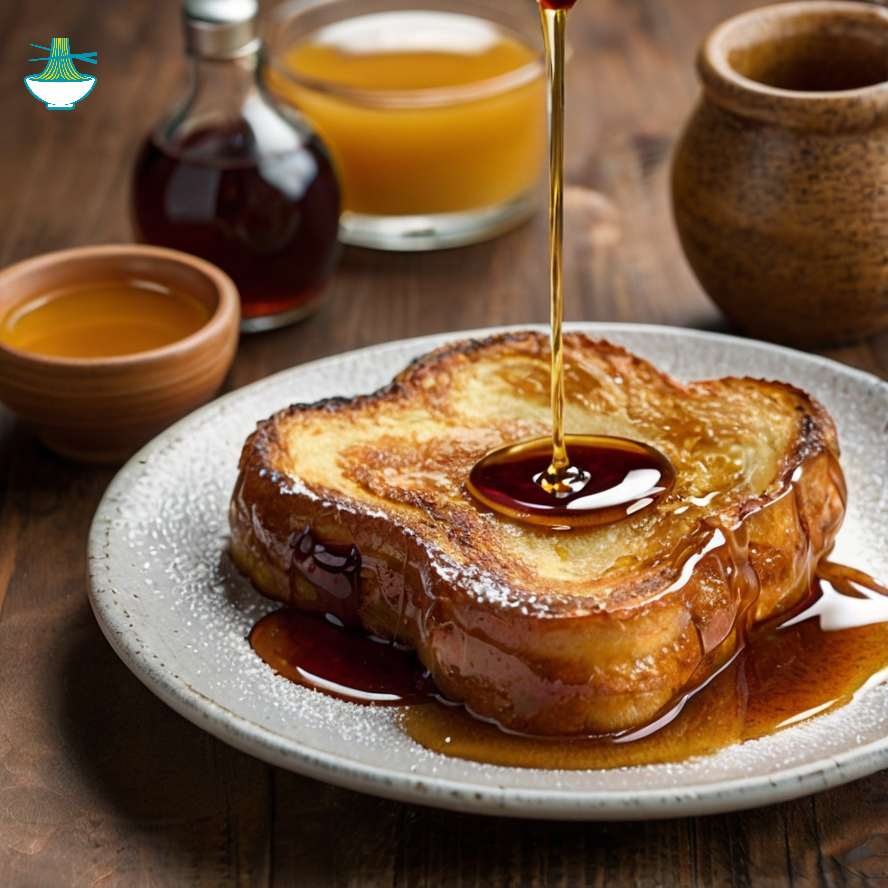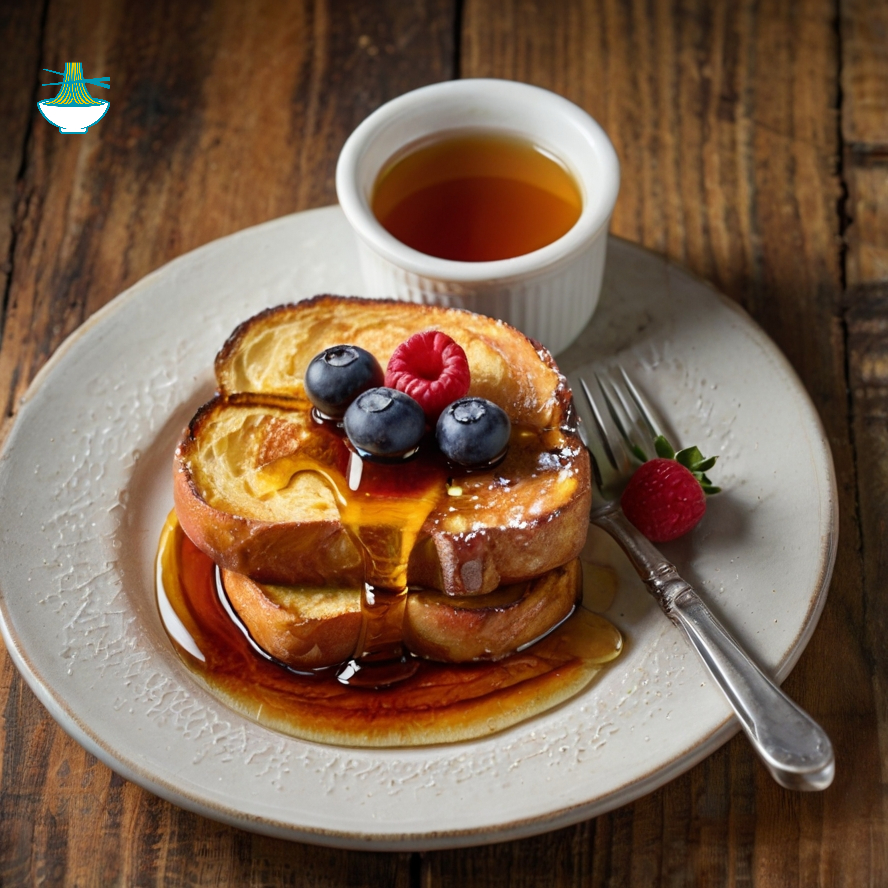Venezuelan Torrejas: A local take on French toast, made by soaking bread in a mix of milk, eggs, sugar, cinnamon, and nutmeg, then frying to golden crispiness .

The history of torrejas traces back to Spain, where similar versions of the dish have been enjoyed for centuries. It is believed that torrejas were brought to Venezuela during the colonial period and adapted to local tastes and ingredients, such as using native bread varieties and incorporating tropical flavors like coconut or plantains.
Today, torrejas are a beloved breakfast or dessert item in Venezuelan cuisine, often served with a drizzle of syrup or honey for added sweetness. The dish's popularity extends beyond Venezuela, with variations found in other Latin American countries and even in some parts of Europe.
For Torrejas, you'll need:
Ingredients:
- Slices of bread (white or whole wheat, preferably stale)
- Milk
- Eggs
- Sugar
- Cinnamon
- Nutmeg
- Vegetable oil (for frying)
- Syrup or honey (for serving)

Method:
1. In a shallow dish, whisk together milk, eggs, sugar, cinnamon, and nutmeg.
2. Dip each slice of bread into the milk and egg mixture, ensuring it's well-coated.
3. Heat vegetable oil in a skillet over medium heat.
4. Fry the soaked bread slices until golden brown and crispy on both sides, about 2-3 minutes per side.
5. Remove the torrejas from the skillet and drain excess oil on paper towels.
6. Serve the torrejas warm with a drizzle of syrup or honey.
Nutrition Value:
1. Slices of bread (white or whole wheat, preferably stale):
- Calories: Varies based on type and size, typically around 70-120 calories per slice.
- Carbohydrates: Around 10-20 grams per slice.
- Protein: About 2-5 grams per slice.
- Fat: Minimal, usually less than 1 gram per slice.
- Sodium: Varies, typically 100-200 milligrams per slice.
- Cholesterol: None in bread.
- Vitamins and minerals: Provides some B vitamins (especially in whole wheat), iron, and fiber.
- Nutritional benefits: Provides energy from carbohydrates, some protein for muscle maintenance, and fiber for digestive health (more in whole wheat).
2. Milk:
- Calories: Approximately 80-150 calories per cup depending on fat content (whole, low-fat, skim).
- Carbohydrates: Around 11-13 grams per cup (mainly from lactose).
- Protein: About 7-9 grams per cup.
- Fat: Varies from negligible (skim milk) to around 8 grams (whole milk) per cup.
- Sodium: Typically around 100-150 milligrams per cup.
- Cholesterol: Varies with fat content, from around 5-25 milligrams per cup.
- Vitamins and minerals: Rich in calcium, vitamin D (fortified), vitamin B12, phosphorus, and riboflavin.
- Nutritional benefits: Supports bone health, provides protein for muscle growth and repair, and offers essential vitamins and minerals.
3. Eggs:
- Calories: About 70-80 calories per large egg.
- Carbohydrates: Less than 1 gram per egg.
- Protein: Around 6 grams per egg.
- Fat: Approximately 5 grams per egg, mainly from healthy unsaturated fats.
- Sodium: Around 70-80 milligrams per egg.
- Cholesterol: Approximately 185 milligrams per egg.
- Vitamins and minerals: High in vitamin B12, vitamin D, riboflavin, and choline, with some iron and zinc.
- Nutritional benefits: Excellent source of high-quality protein, essential vitamins, and minerals, especially beneficial for muscle development and brain function.
4. Sugar:
- Calories: Provides about 16 calories per teaspoon (4 grams).
- Carbohydrates: Purely simple carbohydrates (sucrose).
- Protein: None.
- Fat: None.
- Sodium: None.
- Cholesterol: None.
- Vitamins and minerals: No significant nutritional value beyond providing quick energy.
- Nutritional benefits: Provides quick energy but lacks essential nutrients, so it's best consumed in moderation.
5. Cinnamon:
- Calories: Very low, negligible (less than 5 calories per teaspoon).
- Carbohydrates: About 2 grams per teaspoon.
- Protein: Minimal.
- Fat: Almost none.
- Sodium: Minimal.
- Cholesterol: None.
- Vitamins and minerals: Contains small amounts of calcium, manganese, and vitamin K.
- Nutritional benefits: Antioxidant properties, may help lower blood sugar levels and improve heart health.
6. Nutmeg:
- Calories: Low, about 6 calories per teaspoon.
- Carbohydrates: Less than 1 gram per teaspoon.
- Protein: Negligible.
- Fat: Minimal.
- Sodium: Very low.
- Cholesterol: None.
- Vitamins and minerals: Contains small amounts of manganese, copper, and magnesium.
- Nutritional benefits: May have anti-inflammatory and digestive health benefits, but typically used in small quantities due to its strong flavor.
7. Vegetable oil (for frying):
- Calories: About 120 calories per tablespoon.
- Carbohydrates: None.
- Protein: None.
- Fat: About 14 grams per tablespoon.
- Sodium: None.
- Cholesterol: None.
- Vitamins and minerals: Varies based on the type of oil, but typically a source of vitamin E and healthy fats.
- Nutritional benefits: Provides healthy fats (monounsaturated or polyunsaturated depending on the oil) that support heart health when used in moderation.
8. Syrup or honey (for serving):
- Calories: Varies based on type and amount, around 50-60 calories per tablespoon for syrup, and around 60-70 calories per tablespoon for honey.
- Carbohydrates: Mostly sugars, around 14-17 grams per tablespoon for syrup and 17-19 grams per tablespoon for honey.
- Protein: None.
- Fat: None.
- Sodium: Very low.
- Cholesterol: None.
- Vitamins and minerals: Honey contains small amounts of vitamins and minerals, including vitamin C, calcium, and iron.
- Nutritional benefits: Syrup and honey provide sweetness and energy but are high in sugars, so they should be used sparingly. Honey also offers some antioxidant and antimicrobial properties.


Comments